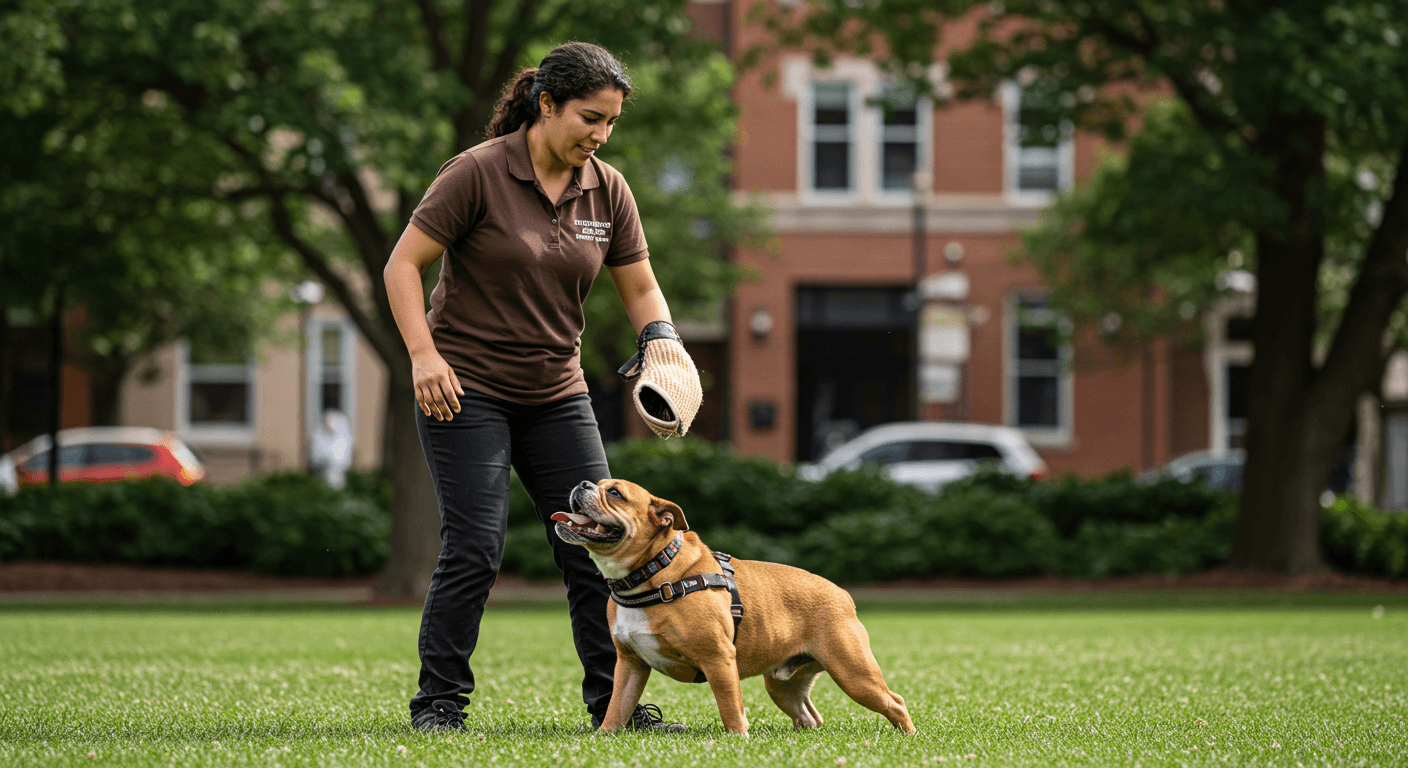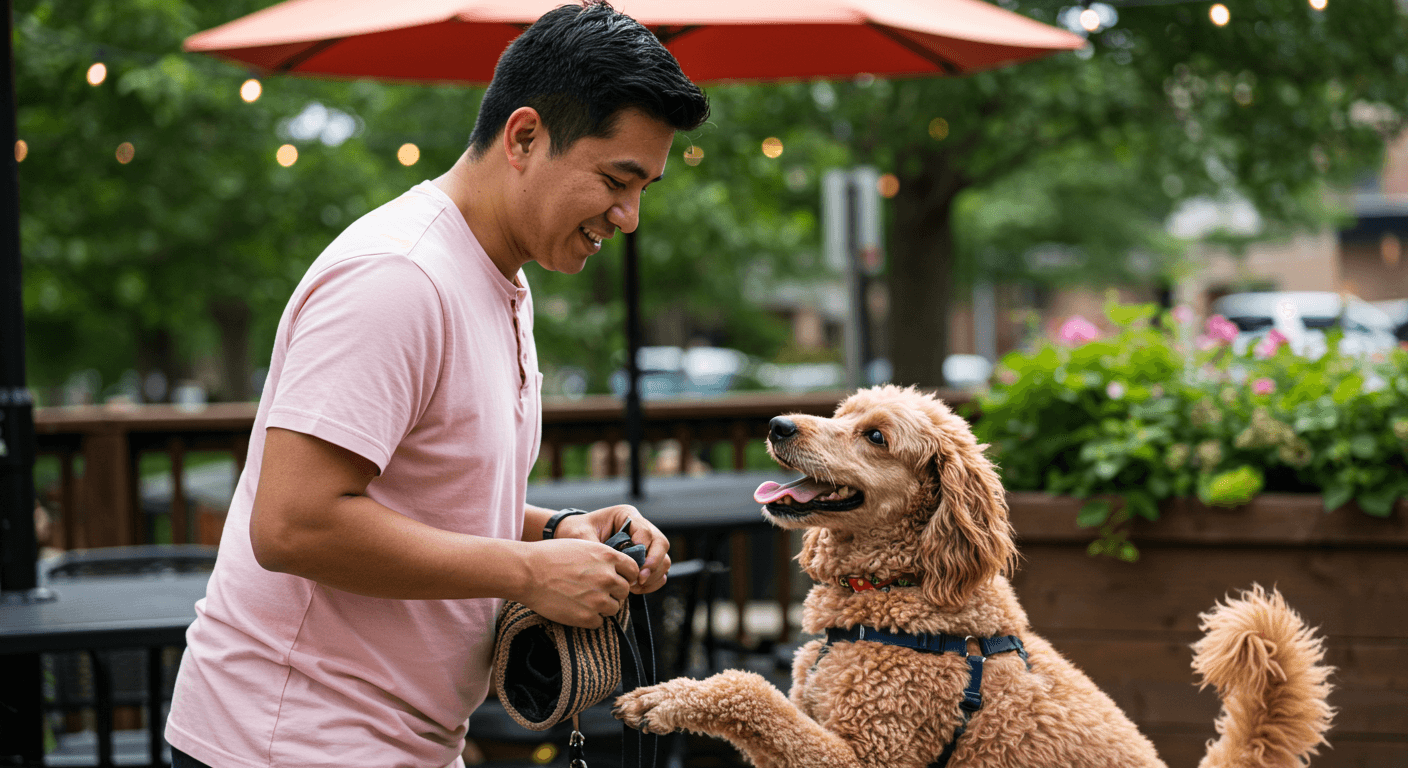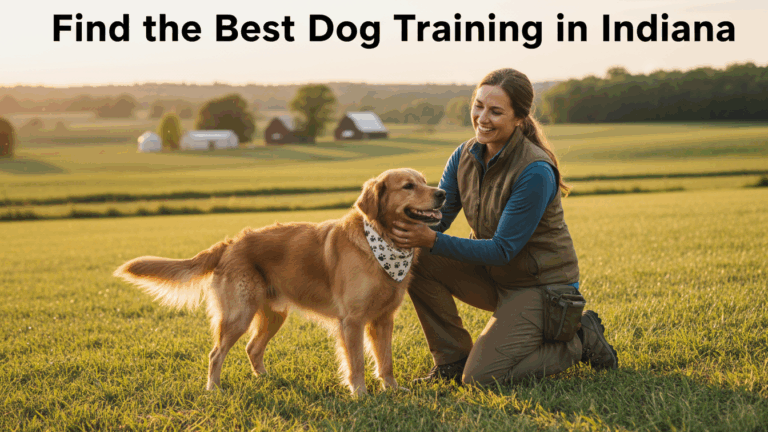Your Complete Guide to Choosing a Dog Trainer in Indiana
Finding the right professional dog trainer in Indiana means understanding what works for your dog’s specific needs and your lifestyle. Whether you’re in Indianapolis dealing with downtown foot traffic, navigating the trails around Bloomington, or managing farm life in rural counties, your training goals will vary based on where you live and what challenges you face daily.
Indiana’s diverse landscape creates unique training scenarios. Urban dog owners need help with leash reactivity on busy sidewalks and polite behavior in pet-friendly businesses. Suburban families want reliable recall in unfenced yards and calm manners around neighborhood kids. Rural dogs might need training for livestock boundaries, wildlife distractions, and long property lines.
Good training helps your dog handle whatever Indiana throws at you, from summer festivals to winter ice on the sidewalks.
How to Choose the Right Trainer
Start by identifying what you actually need. Puppy training focuses on socialization, potty training, and bite inhibition during those critical early months. Basic obedience covers sit, down, stay, and loose-leash walking for everyday life. Behavior modification addresses fear, aggression, reactivity, or separation anxiety through careful, systematic work.
Look for trainers who emphasize positive reinforcement training methods. These reward-based approaches build trust and create lasting behavior changes without relying on fear or pain. They’re also safer for you, your dog, and anyone your dog encounters in public spaces.
Credentials give you a quick way to evaluate a trainer’s education and commitment to professional standards. Common dog trainer certifications include CPDT-KA, KPA-CTP, and IAABC-CDBC for serious behavior problems. For aggression or complex cases, look for someone with CBCC-KA or a program like CTC.
In-home dog training works well for door manners, household rules, and neighborhood leash skills. Group classes make sense once your dog can focus around distractions. Private lessons let you customize everything around your schedule and specific goals.
Most expert dog trainers offer a free consultation or free evaluation before you commit. Use that time to see how they interact with your dog and whether their communication style makes sense to you.
Common Dog Training Methods Explained

Positive reinforcement builds the behaviors you want by rewarding your dog when they get things right. This creates a well-behaved dog who chooses good manners because they’ve learned it pays off, not because they’re afraid of consequences.
Obedience training teaches the foundation skills every dog needs: sit, down, stay, place, recall, and leash training. These basics give you control in everyday situations, from answering the door to walking past other dogs on the sidewalk.
Puppy classes focus on early socialization, bite inhibition, crate training, and preventing problems before they start. The first few months shape your puppy’s confidence and habits for life, so starting early makes everything easier later.
Behavior modification uses desensitization and counterconditioning to change how your dog feels about triggers. This systematic approach works for reactivity, fear, resource guarding, and separation anxiety. Complex cases often benefit from collaboration between your trainer and your veterinarian.
Dog training classes provide structured group learning where your dog practices good manners around other dogs and people. The best group classes screen participants carefully, give dogs plenty of space, and teach calm focus rather than just excitement.
Board and train programs let a trainer work with your dog intensively for one to several weeks. Your dog lives with the trainer or at their facility while learning new skills. You’ll still need follow-up training sessions to learn how to maintain the progress at home.
Service dog training and therapy dog training require specialized skills, public-access work, and clear task training. These programs demand higher standards and longer timelines than basic obedience.
Stay away from methods that use fear, pain, or intimidation. Humane training produces better long-term results and keeps your dog emotionally healthy.
Average Cost of Dog Training in Indiana (Updated for 2025)
Training prices across Indiana vary based on the trainer’s experience, session length, location, and whether you’re in a major metro area or a smaller community. Here’s what most dog owners are paying in 2025.
| Service Type | Average Cost (Indiana) |
|---|---|
| Puppy classes (4-6 weeks) | $140-$250 total |
| Group obedience classes (4-6 weeks) | $150-$280 total |
| Private lessons (60-90 min) | $100-$175 per session |
| In-home training packages (4-6 visits) | $400-$850 total |
| Day training (per week) | $425-$900 |
| Behavior consultation (initial) | $140-$225 |
| Board and train (2-4 weeks) | $1,800-$4,200 total |
Urban areas like Indianapolis and its surrounding suburbs tend to run higher than smaller towns. Expect additional travel fees if you’re in a rural area or far from the trainer’s home base.
Make sure you understand what’s included in the quoted price. Ask about the number of training sessions, follow-up support, written materials, and any extra costs for specialized equipment or extended travel.
Questions to Ask a Potential Dog Trainer
- What training methods do you use, and how do you handle situations when my dog doesn’t understand or gets frustrated?
- What certifications do you hold, like CPDT-KSA or KPA-CTP, and how do you keep your skills current?
- How will you customize your training program to fit my dog’s personality and my specific goals?
- Do you offer in-home visits, group classes, or day training, and which format works best for what I need?
- How will we track progress and know when my dog is ready for more challenging situations?
- What are the total costs, including any travel fees or required equipment, and what’s your cancellation policy?
- Do you carry liability insurance, and can you provide proof?
- For behavior issues, do you work with veterinarians or veterinary behaviorists when needed?
- What will I need to practice between sessions to help my dog succeed?
- Can I observe a class or session before signing up?
Local Indiana Rules and Considerations
Indiana law requires all dogs over three months old to be vaccinated against rabies. You’ll need to keep vaccination records current and have proof available when requested by authorities. State regulations are managed through the Indiana State Board of Animal Health.
Most Indiana cities and towns enforce leash laws requiring dogs to be on leash in public spaces. Specific rules vary by municipality, so check your local ordinances. Leashes must typically be no longer than six feet in parks and public areas.
Many Indiana communities have noise ordinances that cover excessive barking. If your dog has separation anxiety or alert barking issues, work with your trainer on these behaviors before neighbors file complaints.
Indiana doesn’t require dog trainers to hold state licenses or certifications. However, trainers who board dogs as part of their dog training services may need to meet kennel regulations through their county or local animal control authority.
Professional trainers should carry liability insurance to protect themselves and their clients during training sessions. This is especially important for in-home work and any training that happens on public property.
Some Indiana cities require dog licenses or registrations. Check with your local city or county clerk to understand what applies in your area.
Local Indiana Resources for Dog Owners
These locations give you great places to practice recall, work on distractions, and provide enrichment for your dog. Always follow posted rules and pick up after your pet.
- Eagle Creek Park Dog Park in Indianapolis offers a large fenced area where dogs can practice off-leash recall and socialization in a controlled environment
- Broad Ripple Park Dog Park in Indianapolis provides separate areas for large and small dogs with plenty of space for training for dogs at all skill levels
- Columbian Park Dog Park in Lafayette features fenced zones where you can safely work on recall and play while your dog learns good manners around other animals
Many Indiana state parks allow leashed dogs on trails and in picnic areas. These provide excellent opportunities to practice loose-leash walking, focus around wildlife, and calm behavior near other hikers and families.

FAQs
How much does in-home dog training cost?
Most Indiana trainers charge $100-$175 per in-home session, with package discounts available when you book multiple visits. Behavior modification work typically costs more than basic obedience.
Is in-home dog training worth it?
Yes, because you’re addressing problems exactly where they happen. Your trainer can work on door manners, jumping on guests, counter-surfing, and other household issues in your actual environment, then step outside to practice leash skills on your regular walking routes.
Can you pay someone to house train your dog?
Absolutely. Many trainers offer puppy training programs that include potty training schedules, crate training, and management strategies. Day training can speed up the process significantly while teaching you how to maintain the routine.
What is the 3-3-3 rule for dog training?
This guideline describes the adjustment period for newly adopted dogs: expect about 3 days for your dog to decompress, 3 weeks to learn your routines, and 3 months to feel fully settled. Effective training programs work with this natural timeline rather than against it.
How long will it take to reach my training goals?
Most puppies and friendly adult dogs show solid progress in 4-8 weeks with consistent daily practice. Fear-based behaviors, reactivity, and aggression typically require several months of careful behavior modification with gradual increases in difficulty and distraction levels.
What should I bring to group classes?
Pack a flat collar or harness, a standard 6-foot leash, high-value treats your dog loves, water, and current vaccination records if your trainer requires them. Leave retractable leashes at home for safety reasons.
What’s the leash law in Indiana?
Leash laws vary by city and town throughout Indiana. Most municipalities require dogs to be leashed in public areas except inside designated off-leash dog parks. Check your local ordinances for specific requirements in your community.
Do I need a dog license in Indiana?
Some Indiana cities and counties require dog licenses or registrations, while others don’t. Contact your local city or county clerk’s office to find out what applies where you live. Rabies vaccination is mandatory statewide regardless of local licensing rules.
What shots does my dog need in Indiana?
Indiana law requires rabies vaccination for all dogs over three months old. Your veterinarian may also recommend distemper-parvo combination vaccines, bordetella for kennel cough, and others based on your dog’s lifestyle and exposure risks. The Indiana State Board of Animal Health oversees animal health regulations.
Are dog trainers required to be licensed in Indiana?
No, Indiana doesn’t require special licenses or certifications for dog trainers. Trainers follow standard business regulations. If a trainer operates a boarding facility as part of board and train services, they may need to meet local kennel licensing requirements through their county or municipality.
Where can I practice off-leash recall?
Use designated fenced dog parks to keep practice sessions safe and legal. Many Indiana communities have enclosed dog parks where you can work on recall without risking your dog running into traffic or getting lost. Private property with permission from the owner is another safe option.
Which dog parks allow training around Indiana?
Most Indiana dog parks welcome training as long as you’re not disrupting other users or operating a commercial business without permits. Eagle Creek Park Dog Park and Broad Ripple Park Dog Park in Indianapolis both allow practice sessions during regular hours. Columbian Park Dog Park in Lafayette is another good option for working on recall and socialization skills.
What beaches or trails allow dogs for training?
Indiana Dunes State Park allows leashed dogs on some trails and beach areas, making it excellent for practicing calm behavior around water, sand, and crowds. Many state parks throughout Indiana permit leashed dogs on trails, giving you natural environments to work on focus around wildlife, other hikers, and varied terrain. Always check specific park regulations before visiting.
What’s the difference between a certified dog trainer and other trainers?
A certified dog trainer has completed formal education, passed exams, and agreed to follow professional standards set by credentialing organizations. Certification doesn’t guarantee quality, but it shows a trainer has invested in their education and stays current with modern, science-based methods.
When should I start training my puppy?
Start training as soon as you bring your puppy home, typically around 8 weeks old. Early puppy classes focus on socialization during the critical period before 16 weeks. Basic manners and potty training can begin immediately in short, positive sessions.
Can aggressive dogs be trained?
Yes, with careful behavior modification by an experienced professional. Aggression requires systematic desensitization, management strategies to prevent rehearsal of the behavior, and often collaboration with your veterinarian to rule out pain or medical issues. Look for trainers with advanced certifications in behavior consulting.
How do I know if my dog needs private lessons or group classes?
Private lessons work best for behavior problems, aggressive dog training, severe fear or reactivity, and customized goals. Group classes suit dogs who can focus around distractions and benefit from practicing polite behavior near other dogs. Many dogs do well with a combination, starting with private work and graduating to group classes.
The right combination of professional guidance, consistent practice, and patience will help your dog become the confident, well-mannered companion you want. Whether you choose group classes or in-home training sessions, focus on finding a trainer who uses humane methods and understands what life with a dog in Indiana really looks like.
